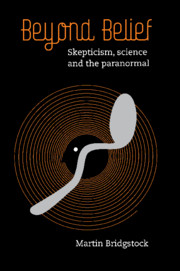Book contents
- Frontmatter
- Contents
- Preface
- Introduction: The paranormal and why it matters
- Chapter 1 The nature of science
- Chapter 2 The paranormal
- Chapter 3 Skepticism – from Socrates to Hume
- Chapter 4 Modern skepticism
- Chapter 5 Bringing skepticism down to earth
- Chapter 6 Skepticism, ethics and survival
- Chapter 7 Skepticism beyond the paranormal
- Bibliography
- Index
Chapter 1 - The nature of science
Published online by Cambridge University Press: 05 April 2010
- Frontmatter
- Contents
- Preface
- Introduction: The paranormal and why it matters
- Chapter 1 The nature of science
- Chapter 2 The paranormal
- Chapter 3 Skepticism – from Socrates to Hume
- Chapter 4 Modern skepticism
- Chapter 5 Bringing skepticism down to earth
- Chapter 6 Skepticism, ethics and survival
- Chapter 7 Skepticism beyond the paranormal
- Bibliography
- Index
Summary
You may feel a little cheated by the subject of this chapter. Isn't this book about investigating the paranormal? Why should we spend a whole chapter looking at science? There are at least two compelling answers. First, both the paranormal and skepticism are defined in terms of science: we will see this in Chapters two and three. Without some understanding of science, the other key terms will make no sense. Second, many paranormal practitioners argue that they are in fact doing science. Others are fiercely opposed to the idea. Science is simply too important to be ignored, and we need to know how it works.
What is science? For centuries, philosophers have tried to work out exactly how scientific knowledge differs from other types of knowledge. In general, the attempts have failed. Alan Chalmers (1988) has written a good summary of the major attempts. In this chapter we will outline a couple of simple models of science. In turn, these will enable us to understand some key points about both skepticism and the paranormal.
We might start with the views of one of the greatest scientists of all time. Albert Einstein summarised the entire goal of science in a single sentence: ‘The grand aim of all science is to cover the greatest number of empirical facts by logical deduction from the smallest number of hypotheses or axioms.’ (Calaprice 1996, p. 178).
Let us unpick this concise statement a bit more, as it tells us a great deal.
- Type
- Chapter
- Information
- Beyond BeliefSkepticism, Science and the Paranormal, pp. 12 - 37Publisher: Cambridge University PressPrint publication year: 2009



